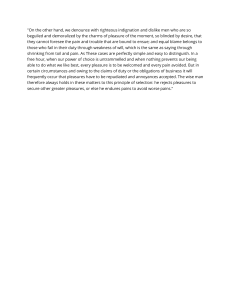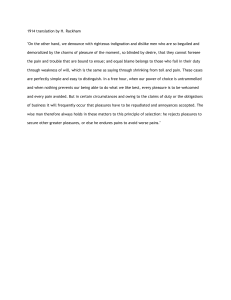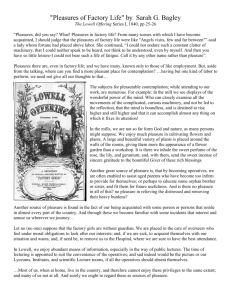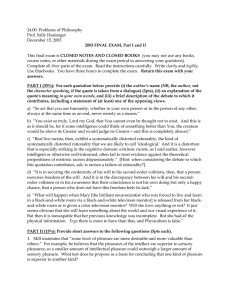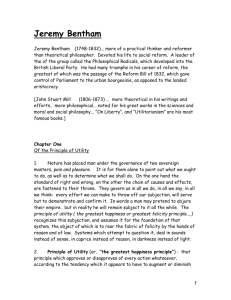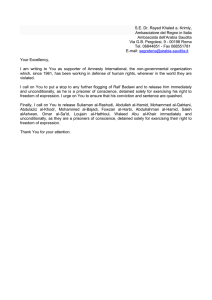Letter to Menoeceus
advertisement
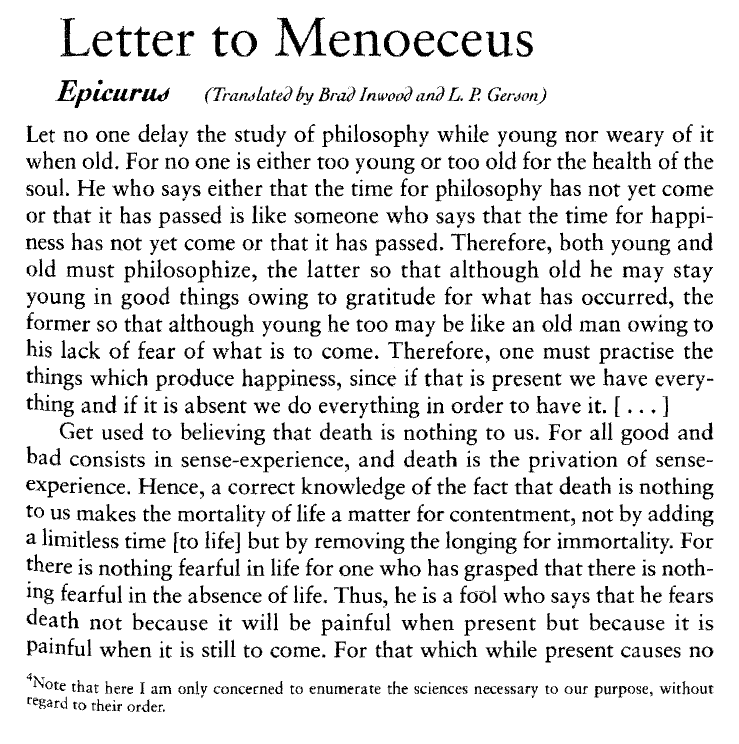
Letter to Menoeceus Epicurll«1 (TranAated by Brad Inwo(Jd and L. R Geraon) Let no one delay the study of philosophy while young nor weary of it when old. For no one is either too young or too old for the health of the soul. He who says either that the time for philosophy has not yet come or that it has passed is like someone who says that the time for happiness has not yet come or that it has passed. Therefore, both young and old must philosophize, the latter so that although old he may stay young in good things owing to gratitude for what has occurred, the former so that although young he too may be like an old man owing to his lack of fear of what is to come. Therefore, one must practise the things which produce happiness, since if that is present we have everything and if it is absent we do everything in order to have it. [ ... ] Get used to believing that death is nothing to us. For all good and bad consists in sense-experience, and death is the privation of senseexperience. Hence, a correct knowledge of the fact that death is nothing to us makes the mortality of life a matter for contentment, not by adding a limitless time [to life] but by removing the longing for immortality. For there is nothing fearful in life for one who has grasped that there is nothing fearful in the absence of life. Thus, he is a fool who says that he fears death not because it will be painful when present but because it is painful when it is still to come. For that which while present causes no 4i\ote that here I am only concerned to enumerate the sciences necessary to our purpose, without regard to their order. l"t • .>/:ctlun vne wny ::ttuay ytillosophy( distress causes unnecessary pain when merely anticipated. So death, the most frightening of bad things, is nothing to us; since when we exist~ death is not yet present, and when death is present, then we do not exist. Therefore, it is relevant neither to the living nor to the dead, since it does not affect the former, and the latter do not exist. But the many sometimes flee death as the greatest of bad things and sometimes choose it as a relief from the bad things in life. But the wise man neither rejects life nor fears death. For living does not offend him, nor does he believe not living to be something bad. And just as he does not unconditionally choose the largest amount of food but the most pleasant food, so he savours not the longest time but the most pleasant. He who advises the young man to live well and the old man to die well is simple-minded, not just because of the pleasing aspects of life but because the same kind of practice produces a good life and a good death. Mudiworse is he who says that it is good not to be born, "but when born to pass through the gates of Hades as quickly as possible."l For if he really believes what he says, why doesn't he leave life? For it is easy for him to do, if he has firmly decided on it. But if he is joking, he is wasting his time among men who don't welcome it. We must remember that what will happen is neither unconditionally within our power nor unconditionally outside our power, so that we will not unconditionally expect that it will occur nor despair of it as unconditionally not going to occur. [ ... ] And this is why we say that pleasure is the starting-point and goal of living blessedly. For we recognized this as our first innate good, and this is our starting point for every choice and avoidance and we come to this by judging every good by the criterion of feeling. And it is just because this is the first innate good that we do not choose every pleasure; but sometimes we pass up many pleasures when we get a larger amount of what is uncongenial from them. And we believe many pains to be better than pleasures when a greater pleasure follows for a long while if we endure the pains. So every pleasure is a good thing, since it has a nature congenial [to us], but not everyone is to be chosen. Just as every pain too is a bad thing, but not everyone is such as to be always avoided. So when we say that pleasure is the goal we do not mean the pleasures of the profligate or the pleasures of consumption, as some believe, either from ignorance and disagreement or from deliberate misinterpretation, but rather the lacko'£pain in the body and disturbance in the soul. For it is not drinking bouts) and continuous partying and enjoying boys and women, or consu~ng)ish and the other dainties of an extravagant ,./ ITheognis 425, 427. Alfred Mele Philosophy, a Bus Ride, and Dumb Luck • 1S table, which produce the pleasant life, but sober calculation which searches out the reasons for every choice and avoidance and drives out the opinions which are the source of the greatest turmoil for men's souls. [ ... J Practise these and the related precepts day and night, by yourself and with a like-minded friend, and you will never be disturbed either when awake or in sleep, and you will live as a god among men. For a man who lives among immortal goods is in no respect like a mere mortal animal.
